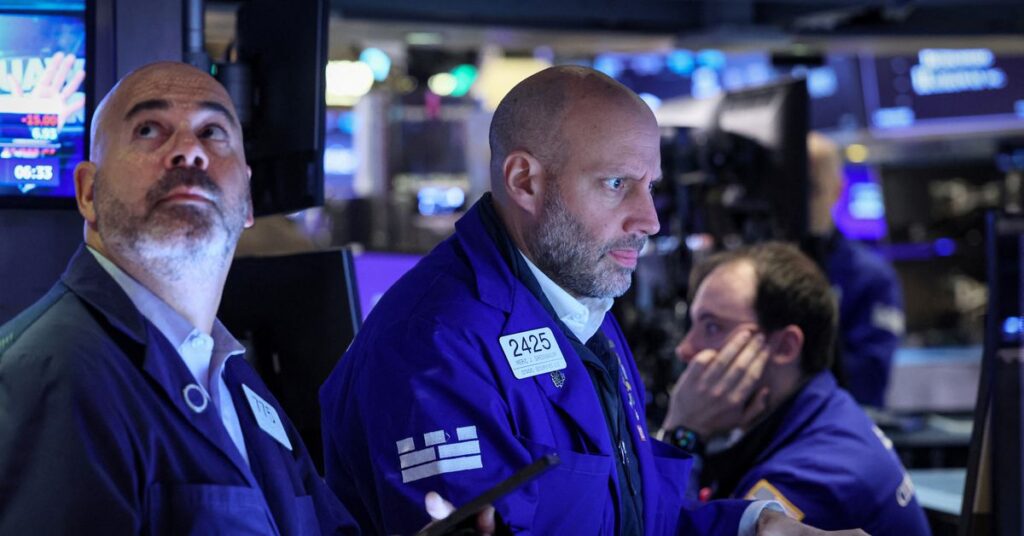Nov 3 (Reuters) – Wall Street’s main stock indexes rallied on Friday as bond yields fell sharply after data showed signs of slowing U.S. jobs growth and an uptick in unemployment, boosting hopes that the Federal Reserve is done with its interest rate hiking campaign.
The Labor Department’s report showed nonfarm payrolls increased by 150,000 jobs in October, much less than the expected 180,000 increase, partly due to strikes at Detroit’s Big Three automakers.
Data for the last month was revised lower to show an increase of 297,000 instead of 336,000. The unemployment rate edged up to 3.9%.
“From a policy perspective this gives confidence the Fed remains on hold for the foreseeable future and only really hikes again if growth or inflation accelerate from here,” said Matt Palazzolo, senior investment strategist at Bernstein Private Wealth Management.
But what Palazzolo expects to happen is a steady deceleration in labor market gains and economic activity for the next six to nine months and, provided that happens it “should allow for the Fed to stay on hold at current levels,” he said.
The Dow Jones Industrial Average (.DJI) rose 222.24 points, or 0.66%, to 34,061.32, the S&P 500 (.SPX) gained 40.56 points, or 0.94%, to 4,358.34 and the Nasdaq Composite (.IXIC) added 184.09 points, or 1.38%, to 13,478.28.
For the week, the S&P 500 gained 5.9%, for its biggest gain since November 2022 and Nasdaq added 6.6%, also showing its biggest gain since Nov. 2022. The Dow showed a weekly gain of 5.1%, its biggest since late October 2022.
The jobs data also helped push U.S. Treasury yields lower for the fourth consecutive session. During the session the benchmark 10-year Treasury yield hit its lowest level in over five weeks. The move in yields supported stocks.
“Falling interest rates is probably the top catalyst this week,” said Tony Welch, CIO of SignatureFD, Atlanta Georgia, adding the jobs report supported this trend.
The small-cap Russell 2000 index (.RUT) outperformed large-cap indexes on Friday, closing up 2.7% after touched its highest level since Oct. 17. It boasted a weekly gain of 7.6%, which was its biggest since February 2021.
SignatureFD’s Welch noted that the prospect of stalling rate hikes was particularly good news for smaller companies, which depend heavily on borrowing.
[1/2]Traders work on the floor at the New York Stock Exchange (NYSE) in New York City, U.S., October 26, 2023. REUTERS/Brendan McDermid/File Photo Acquire Licensing Rights
The tech-heavy Nasdaq (.IXIC) boasted its sixth straight day in the green while the S&P 500 and the Dow showed their fifth consecutive sessions of gains.
Most of the 11 major S&P 500 sectors advanced, led by rate-sensitive real estate (.SPLRCR), which finished up 2.4%, after hitting its highest since late September.
Of the 11 only the energy sector (.SPNY) fell, ending down more than 1% on the day as oil prices fell.
Welch also noted that solid earnings reports were helping stocks during the week as companies expanded profit margins.
Analysts expect earnings growth of 5.7% for S&P 500 companies in the third quarter, with over 81% of the 403 companies in the benchmark index that have reported profits so far having beaten estimates, per LSEG data.
However, Apple (AAPL.O) fell 0.5% on the day after its sales forecast for the holiday quarter was short of expectations.
Among major movers, Block (SQ.N) jumped 10.7% after raising its annual adjusted profit forecast. Fortinet (FTNT.O) dropped 12.4% after a downbeat fourth-quarter revenue forecast.
During the session, the CBOE volatility index (.VIX) touched a fresh six-week low, reflecting easing investor anxiety.
Advancing issues outnumbered declining ones on the NYSE by a 5.55-to-1 ratio; on Nasdaq, a 3.56-to-1 ratio favored advancers.
The S&P 500 posted 20 new 52-week highs and no new lows; the Nasdaq Composite recorded 53 new highs and 77 new lows.
On U.S. exchanges 12.05 billion shares changed hands compared with the 10.86 billion average for the last 20 sessions.
Reporting by Sinéad Carew in New York, Amruta Khandekar and Shristi Achar A; Editing by Sriraj Kalluvila, Maju Samuel and David Gregorio
: .


